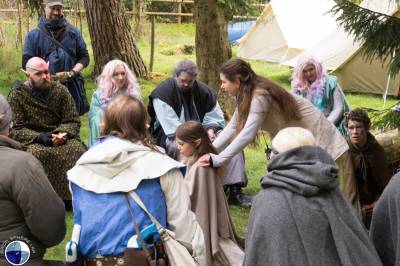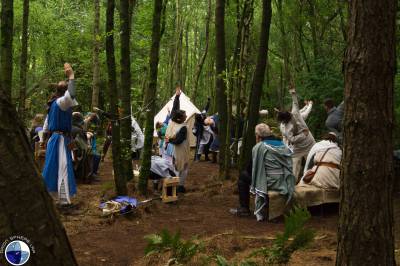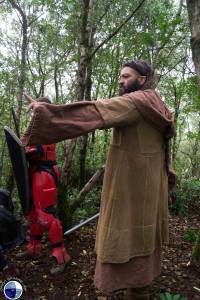User Tools
Sidebar
Table of Contents
Commonality Leadership
The Commonality organises itself via two main principles - collective decision-making at all levels, and the advice of the Judges. These two principles work in harmony to give the Commonality both long-term planning and strategic oversight. They resonate with the Commonality’s philosophy of nurturing interconnectedness and avoiding Entropy and chaos wherever possible, although from an outside perspective the Commonality approach can quash individual action and lacks responsiveness to rapidly evolving situations.
The Commonality views its organisational structure as being superior to all of the other Factions, as it prioritises the elements that their philosophy espouses. They believe that their approach allows for fluid decisions that are stable over the long term, made with the full consent of those who must abide by them.
- The Free Union’s chaotic and variable systems are fluid, but their decisions are often reversed or overturned at the whims of the masses and their untenured leaders.
- The Ascendancy’s rigid hierarchy allows for long-term planning, but its rigidity makes it slow to react. Politicking and ineffective leaders bottleneck the process, and the Ascendancy rarely seeks the consent of its citizenry.
Confluence
 Within the Commonality, decisions are made as a group of all parties coming to a mutual shared understanding of the best way to proceed. Groups of Commonality citizens meet regularly in a structured meeting known as a Confluence, to decide on matters that are relevant to those present.
Within the Commonality, decisions are made as a group of all parties coming to a mutual shared understanding of the best way to proceed. Groups of Commonality citizens meet regularly in a structured meeting known as a Confluence, to decide on matters that are relevant to those present.
Confluence Structure
In a Confluence, members typically bring forward issues that they would like a decision made on, and present potential outcomes that may arise if one or another course are followed. Other members are then allowed to speak, presenting relevant information, predictions or viewpoints. Personal attacks, rhetorical tricks and fallacious arguments are frowned upon - the Confluence is a venue for effective decision-making that benefits the Commonality as a whole, not scoring points or “defeating” a personal opponent. Once all the relevant information has been brought up, the Confluence attempts to negotiate a collective decision, preferably unanimously.
In practice, if members of a Confluence wish to bring up an important issue that they have an opinion on, they will generally do the “ground work” before bringing it up at all. Usually this means that there is a certain amount of politicking and convincing other parties of the merits of their argument before the Confluence begins.
Once a matter has been decided upon, it is considered Settled, and all members of the Confluence are expected to abide by the collective decision, regardless of their own personal opinions on the subject. Settled matters remain so until strong evidence can be put forward that the underlying conditions informing the original decision have changed - if new scientific evidence comes to light, flaws are revealed in the information that the decision was made with, etc. The burden of evidence for re-opening a Settled Decision is high, so attempts to do so are not taken lightly.
Philosophically, the Confluence (as the name suggests) is believed to be an idealised merging of information, personality and context, which, through the process of debate and thought, produces a decision that is “perfect” for the circumstances in which it arose. Allowing the matter to be re-opened would introduce Entropy to the whole process, making decisions inherently unstable. The Confluence model has held up robustly since the Elysians left their homeworld, and has been able to accommodate new Commonality species and given the Faction much of its strength and longevity today.
A Confluence is usually preceded by a group meditation session, allowing members to concentrate their minds and focus on the decisions at hand. Leaving other cares and personal issues behind is believed to smooth the process of collective decision making and prevent rancour and ill-feeling building up within the Confluence’s members. After the Confluence is complete, members will usually participate in another meditation or collective activity such as a Ritual to return to the space outside the Confluence and refocus on the tasks that must be done.
Confluence Culture
Single individuals can be part of multiple Confluences - their work, community and even entire world can form separate Confluences, each with different members, directives and Settled Decisions. All that is required for a Confluence to be established is the agreement of the participants and the need to come to some kind of group decision. Each Confluence is likely to have slight cultural variations, prominent individuals and different thresholds for making decisions and re-opening Settled issues.
The Commonality as a whole also uses the Confluence model for its larger decisions - with whole worlds sending teams of representatives to Grand Confluences every few years, to decide on the overall direction for the Commonality. These Grand Confluences tend to make abstract decisions on general principles, and leave implementation to smaller Confluences with a better grasp of the finer details of a particular action. Even Judges use a variant of the Confluence model to decide how they guide Commonality society, although they rarely make the process and proceedings of these Confluences public.
Subsuming one’s will solely in the name of groupthink is frowned upon within the Confluence. If members of a Confluence dissent, then the matter usually remains Open - often this will result in the conversation switching to a smaller or more restricted form of the decision at hand. If a Confluence cannot agree on a general principle, then perhaps it can agree on a more specific plan to move forward on at least some elements of the issue. Sometimes, in pressing circumstances where a specific decision needs to be made quickly, the rule of the majority applies and can force a decision over a small number of dissenters. In these cases, the Decision is considered Agreed rather than Settled, and a smaller burden of evidence is required to re-open the Decision. In cases where the decision relates directly to specific members of the Confluence itself, their dissent does not count against the whole, although it is expected in these disciplinary Decisions that the result be unanimous apart from the parties who are the subject of the Decision.
Larger or more critical Confluences may contain professional Facilitators - individuals whose job is to ensure that the Confluence convenes regularly, allows member’s points of view to be heard, makes decisions effectively and does not get bogged down in unimportant details and points of order. Facilitators command considerable respect and are generally deferred to within Confluence on matters of order and procedure. When not in Confluence, Facilitators play an important general role within Commonality society, providing guidance, ensuring that all of its citizens stay involved and are not inappropriately ostracised.
Archons
The Commonality is almost entirely non-hierarchical - the collective decisions of each Confluence are the most powerful authority regarding the individuals in that Confluence. There are certain exceptions - such as the Captain of a Commonality starship, who is granted the decision-making power of the Confluence of their ship in combat situations. In similar situations, over short time periods, the full power of the Confluence is invested within a single individual, referred to as an Archon - although they usually remain accountable to their Confluence when it has time to convene later on. These sorts of arrangements are typically strongly bonded and considerable mutual trust is established between the Archon and their Confluence. Effective Archons are likely to be high-status individuals within the Commonality, and are known for their intelligent and quick decision making.
Other “Titled” individuals do exist within the Commonality, with some authority over Confluences in specific areas. These individuals usually derive their authority either from higher-level Confluences, who appoint them to enforce their Settled Decisions, or from Judges, on whose behalf they can advise and Guide a whole range of Confluences.
Judges
Judges are the closest analogue to “Faction leadership” in the Commonality - in practice their direct control over the Faction is limited, but the combined influence of the Judges over time has gently shaped Commonality cultural and social norms into what it is today. Outside the Commonality, various Judges are rumoured to have been involved in some way in countless momentous events - but never in such a direct fashion that they can be directly implicated. Judges are few and far-between - there are believed to be only a few hundred in total, among the hundreds of billions of Commonality citizens. Typically, they travel from place to place within the Faction, with their own retinue of Facilitators, Justicars and other specialists. They frequently send members of their retinues to provide guidance or direction to Confluences, or advise Archons and various leaders as to how their actions could benefit the Commonality as a whole. Higher-status individuals in the Commonality are more likely to be visited by a Judge or their representatives, and incorporated into their many plans.
Judges are almost universally powerful psions, masters of many of the well-known psionic Paths and often some personal or secret ones as well. As such, the vast majority of Judges are Elysian, as Elysian Psionic theory and practice is the most well-developed of all known species. Individual Judges are elevated from their peers by a panel of three Judges, usually after prolonged periods of apprenticeship in service of other Judges of various stripes. It is in this period that a Judge develops their ideology and beliefs, as they interact with the various aspects of Commonality Society.
From day-to-day, each Judge operates independently of the others, but when two or more Judges meet they will usually hold a small Confluence to share information and gather alternative perspectives on matters at hand. Judicial Confluences only rarely produce Settled Decisions however, and are often considered to be more of a forum for sharing ideas and information. Judges as an institution are beholden only to themselves - no Confluence of non-Judges holds authority over any Judge, and any Judges present in a lay Confluence act in a purely advisory capacity.
Judges in Commonality Society
The role of the Judges within Commonality society is to act as guides and shepherds, assisting other members of the Faction on the path to enlightenment, while maintaining the cohesion and direction of the Commonality as a whole. Customarily, any Commonality citizen will usually be willing to assist a Judge in whatever manner they require, but most will offer compensation in return. Outside this core role, many Judges take on what they see as additional responsibilities - protecting the Commonality from external threats, ensuring historical records are maintained, negotiating with aliens and other powers, monitoring scientific work in a certain area, and countless other things besides. There are no real limits on what a Judge can involve themselves with on one level or another.
Judges tend to focus their efforts on a particular area of interest - some concern themselves with the overall structure of Commonality society, others watch over scientists studying in a particular field, or guide the inhabitants of a particular sector. Some keep vigil for threats that might harm the Faction, either from without or within. As they are not bound by the Settled Decisions of any other Confluence, Judges are able to take actions outside what would be considered the Commonality norms. Rather than use this power ungraciously, judges generally prefer to subtly guide or advise members of the Commonality than to wield their political or psionic power directly. An individual, directed appropriately, coming upon the right decision themselves is considered to be vastly preferable than coercion. Consent of the individual is an important tenet of Confluence and collective decision-making.
Sanctioning
However, not all differences can be resolved, and truly recalcitrant individuals can grind against the gears that keep the Faction functioning, leaving Confluences in deadlock and poisoning the path to enlightenment for others. In the case of some individuals that wilfully position themselves outside the culture and goals of the Commonality as a whole, Judges can act directly to “rectify the issue” as they see it, and sanction the offending party. One of the more serious sanctions a Judge can impose is the wholesale restructuring of an individual’s mind, to better fit life within the Commonality. However, this is considered to be a particularly extreme sanction - a loss of the person that was and all of their potential. Wholesale personality restructuring is usually reserved for psychotic or dangerous individuals who cannot be allowed to participate in Commonality society lest they destroy the opportunities of others to obtain enlightenment. Much more common is a lesser realignment of specific problematic aspects of an individual’s psyche, so as to better fit within the structure of the community. This sort of realignment is frequently handled on the Confluence level, and such realignments are often requested by the individuals themselves, as they detect their growing detachment from the Commonality norms and society.
Although many within the Faction would like to pretend otherwise, psionic surgery and realignments are not a guaranteed cure-all for deviating individuals. Realignment and restructuring do not always “take” and in these cases other solutions must be found. One potential alternative sanction is Exile - if an individual leaving the Commonality would cause little harm to the Faction, then they may be allowed instead to strike out on their own, but without the protection and resources that they once enjoyed. For such outcasts, joining another Faction is almost impossible, and those who do survive usually end up in some desperate enclave or pirate kingdom on the wild outskirts of the Sphere. For outcast Elysians, this often means loss of access to the Nexus Trees and their Auras, advanced training in psionic abilities and many other advantages.
Judge Ideologies
Judges are not a monolith, and hold a variety of views on many of the issues that the Commonality faces. As a self-selecting elite group who meet relatively infrequently, ideological trends tend to reinforce each other over time - typically in line with wider Commonality philosophy, and different ways of interpreting it. With the structure of Confluence and Settled Decisions, most of their differences in ideology concern the future direction of the Faction, and what kind of measures are necessary to reach the Faction’s goals in the short and long terms. In general, the ideologies of Judges land somewhere in between two axes.
- Internalists vs Externalists - an axis concerned with how much the Faction should incorporate influences outside itself.
- Refiners vs Questors - an axis concerned with whether enlightenment relies on new discoveries or distillation of existing known truths.
The Internalist position is that the Commonality should remain focused upon its own citizens and practices. Internalists hold that the Faction is still more divided and chaotic than it needs to be, and that they should focus on increasing the interconnectedness and unity of the Commonality. Strong Internalists work to build community, care for the Nexus Tree network, and ensure that discordant parts of the Faction are brought in line or pruned away. Some Internalists advise that the Commonality should avoid working and cooperating with members of other Factions, lest their influences and ideologies pollute the progress that has already been made.
The Externalist position is that the Commonality is but one node in the wider galaxy, and that its efforts should be focused outwards, increasing the unity and interconnectedness of the galaxy as a whole. This can take the form of encouraging Commonality citizens to work and interact with members of other Factions, spreading the benefits of the Faction’s practices and philosophy. It can also result in Externalists cultivating spy networks and distributing propaganda in other Faction’s territory, which has resulted in more than a few diplomatic incidents, such as during the Elysian Revelation.
The Refiner position is that all of the fundamental truths required to achieve total interconnectedness and unity, and a return to the perfection at the moment of the universes’ creation have already essentially been discovered - or at least the fundamentals have. The work that remains is to perfect and implement them - be that in the Commonality or outside. Refiners focus on the core elements of Commonality philosophy, science and culture - exploring and documenting edge cases, developing new implementations of psionic disciplines and distilling existing practices down to their most effective core beliefs and principles. They guide practitioners of many disciplines towards perfecting their practices, rather than hoping that radical experimentation will deliver success. Although they do not discourage innovation, Refiners prefer that developments are best gained in an incremental fashion, rather than world-shattering departures from existing knowledge. Work with what you already have, and develop it as well as is possible, is the Refiner’s credo.
The Questor position is that the great truths of the cosmos are yet to be discovered. Bold steps and radical experimentations are required to advance the Commonality to the position where they can truly fight back against the entropic decay of the universe and the tilt towards disorder. Questors guide others to strike out into the wider universe, find phenomena never before seen, and see what can be learned from it. Questors encourage scientists to perform more risky experiments, leaders to make significant changes to their societies, and psions to plumb the farthest depths of their mental abilities. Considered dangerously radical by some, Questors have been involved in some of the greatest discoveries in Commonality history, as well as some colossal failures.
In practice, any single individual Judge is likely to lie somewhere in between these axes. Few Judges occupy the most extreme version of a given ideological position - although there are some who are considered exemplars of each position.



